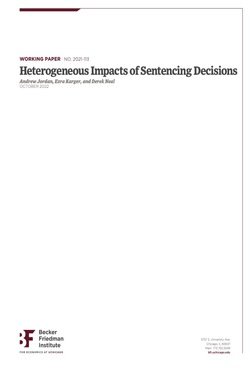Heterogeneous Impacts of Sentencing Decisions
By Andrew Jordan, Ezra Karger and Derek Neal
We examined 70,581 felony court cases filed in Chicago, IL, during the period 1990–2007. We exploit case randomization to assess the impact of judge assignment and sentencing decisions on the arrival of new charges. Our estimates of the impact of incarceration on recidivism show that, in marginal cases, incarceration creates large and lasting reductions in recidivism among first offenders. Yet, among repeat offenders who are marginal candidates for prison, incarceration sentences create only short-run incapacitation effects and no lasting reductions in the incidence of new felony charges. These treatment-impact differences inform on-going legal debates concerning the merits of sentencing rules that offer leniency for first offenders but encourage or mandate incarceration sentences for many repeat offenders.
Chicago: University of Chicago, Becker Friedman Institute for Economics, Working Paper, 2022. 66p.


